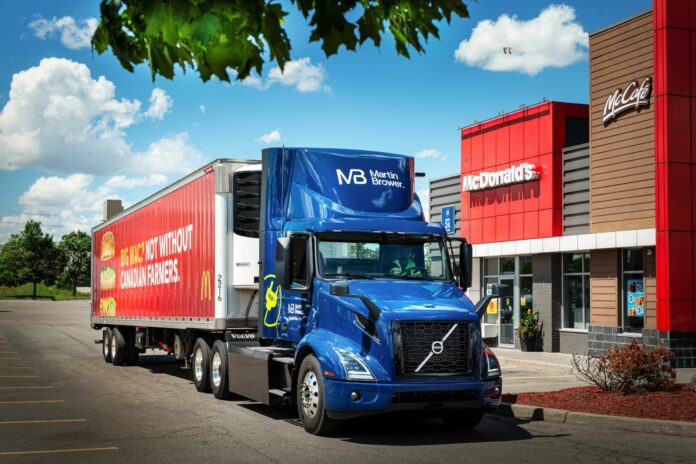The sudden suspension of the Écocamionnage program by the Quebec Ministry of Transport and Sustainable Mobility (MTMD) on Sept. 6 last year took the industry by surprise. The incentive offered carriers financial support for the acquisition of electric heavy-duty vehicles.
However, the program was suspended due to a lack of budgetary availability for the 2024-2025 year, catching fleet buyers and heavy truck dealers off-guard.
“The ministry is aware that the suspension of the Écocamionnage program and the subsidies associated with it may have sparked many reactions within the industry, particularly among dealers and potential buyers of heavy vehicles,” Sarah Bensadoun, spokesperson for the MTMD, told Transport Routier. “Moreover, following this suspension, ministry representatives met with various industry partners to explain the situation to them.”
Several players in the sector agree that the setup and execution of the program was flawed, for several reasons.
First, some industry spokespeople feel that the amount allocated to the program — just $30 million — was inadequate.
“An electric truck in Quebec costs nearly $600,000, and we can get a $150,000 grant from the MTMD. With a budget of $30 million, that’s 71 trucks. It’s going very quickly,” explained Yves Maurais, director of technical and operational files at the Quebec Trucking Association (QTA).
“There will have to be adjustments somewhere. Whether we increase the budget or reduce subsidies, I can’t say. But if they reduce subsidies, people will be less inclined to buy.”
Another surprising factor weighed down the program: while Écocamionnage encouraged the purchase of electric heavy-duty vehicles, some buyers took advantage of it to acquire other types of vehicles. Bensadoun indicated that 43% of the vehicles admitted for the subsidy were Ford F-150 Lightning pickup trucks.
This type of vehicle was technically eligible for the program, because Écocamionnage accepted light vehicles used for commercial purposes, registered with an F or L plate and with a gross vehicle weight rating of less than 4,500 kg. An application for an electric pick-up used, for example, for construction, could therefore qualify for the program.
“Anyone who wanted to buy electric pickups, they took advantage of it,” says Maurais. “They jumped on it because the price was really cheap, because Ford flooded the market and sold its vehicles almost below cost to get rid of them, because inventories were too high. People still had access to the maximum of the subsidy, so they rushed.”
According to industry experts, there may have been miscommunication between the Ministry of Transport and the Ministry of the Environment in accepting these applications.
The budget allocated to Écocamionnage is taken from the Electrification and Climate Change Fund, managed by the Ministry of the Environment. The latter also handles subsidies related to light vehicles, and it is quite possible that the applications for light vehicles were sent to Écocamionnage.
Truck dealers are at the top of the list of those most affected by the suspension of Écocamionnage.
Many are stuck maintaining and keeping electric trucks in inventory — often at high costs — because they can’t sell them without subsidies, as their prices remain too high
“We’re experiencing the same thing as the automobile industry, in the sense that we really need government support to make the transition,” says Bruce Gagnon, director of electrification at Réseau Dynamique. “Electric vehicles are much more expensive than diesel vehicles right now, which is why we need support. I don’t think there’s a carrier that can afford to pay full price for an electric vehicle.”
However, many believe that Écocamionnage does not work for heavy vehicle dealers and that they lack support from the government.
“From the beginning, Écocamionnage has been really poorly designed for truck dealers. We set up a program for heavy trucks that is identical to the one for automobiles. But it’s not the same thing at all,” said Éric Boulianne, general manager of Transdiff Peterbilt.
“No one thought to find out how a heavy truck dealership works. We are at the heart of the electric truck sales process, but we have zero government support.”
Dealers shared several ideas to improve the program. In addition to increasing the budget, they recommended reducing the timeframe for grants, helping to install charging infrastructure at dealerships, offering grants for demonstrator vehicle registrations, and passing the money on to those who purchase the truck.
“We need to resolve four or five major points so that we can make progress in this niche. Otherwise, what will happen is that dealers will abandon everything,” added Boulianne.
Another solution would be the installation of a charging infrastructure for future buyers.
“It’s like the chicken and the egg: if there are no charging stations, we won’t sell any trucks. And if we don’t sell enough trucks, there won’t be any more charging stations, so there won’t be a network,” added Charles Turgeon, sales director for Paré Centre du camion.
However, there is a good chance that Écocamionnage will return.
The program’s website reads that “an additional budget of $35 million has been allocated to Écocamionnage for the 2024-2025 fiscal year to meet the significant needs of the community. This additional sum will make it possible to expand the selection of projects eligible for financial assistance for projects already submitted.”
It is also indicated that “the applications received are currently being analyzed. Applicants will be informed of the decisions related to their request for financial assistance in the coming weeks. No new project submissions will be considered.”
As the program expires on March 31, 2025, steps are reportedly underway to renew it for 2025-2028.


